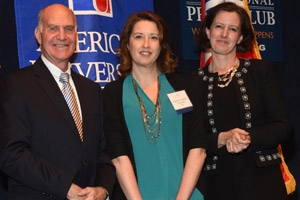Social Sciences
A to ZZZ's: Teens, Sleep, and Emotion Regulation

Kathleen Gunthert (center) receives a faculty teaching award from Provost Scott Bass and Senior Vice Provost Mary Clark.
Kathleen Gunthert's latest research on teens and sleep started with a series of questions: How exactly does sleep affect teenagers and their emotions? What happens when depressed teens—or teens at risk for depression— don't get enough sleep? Does it make it harder for them to recover from stressful situations? And is the link between sleep and emotion more pronounced for them than for teens who are not depressed?
These are critical issues in the sleep-deprived world of today's teenagers. They also have important real-life consequences. "If you have a family history of diabetes, you are going to pay special attention to your teen's diet," said Gunthert, associate professor of psychology at American University. "Now if there's a family history of depression, should you be paying special attention to your teen's sleep? We need research that helps us to understand whether disruptions in sleep are particularly impactful for teens who are at risk for depression."
Questions of sleep and emotion have long been part of Gunthert's research, which focuses on the influence of everyday stress and coping on depression, anxiety, and psychotherapy outcomes. She teaches a wide range of courses at AU, including graduate courses for clinical psychology doctoral students, seminars on stress and coping, and a course in psychopathology. She's also the director of the Clinical Psychology Doctoral Training Program, editor-in-chief of the Behavior Therapist journal, and a research mentor to clinical psychology doctoral students.
The Challenge
Gunthert's latest study focuses specifically on sleep, stress, and emotion in teenagers. When she started her research, her first challenge was determining how to measure sleep and moods in a sizeable sample of teenagers. She recruited 100 Maryland high school students, asked them to fill out baseline surveys about sleep and personality, gave them Fitbits to monitor their sleep for two weeks, and had them keep logs of their emotion regulation—things like stress, negative moods, attention span, impulse control, ruminative thoughts, social anxiety, and ability to capitalize on positive events.
Fitbits tracked how much sleep the teens were getting and used sensors to measure periods of being awake or restless while in bed. Using this data along with the students' twice-daily logs, Gunthert was able to track emotion regulation after good and bad nights of sleep, and compare it to the teens' baselines.
Sleep Deprivation
Gunthert is still crunching the data, but patterns have already emerged. On an average school night, the high school students got just under six hours of sleep. And approximately 15 percent of them slept four-and-a-half hours or less on school nights. These numbers surprised Gunthert, who notes that less than five hours of sleep on consecutive days leads to impaired thinking and judgment. On top of that, the National Sleep Foundation recommends at least eight- and-a-half hours of sleep per night for teens—far from the reality of most students in Gunthert's study.
Gunthert says that long-term outcomes of sleep disturbances can be serious: Studies have found that sleep disturbances are predictive of later emergence of depressive symptoms. Many people think of poor sleep as a consequence of depression, but research suggests that it is also a risk factor. Poor sleep often precedes depression onset. Other outcomes can include increased anxiety, conduct problems, and weight gain.
Technology Usage
Gunthert's study also looked at technology use by asking students to self-report their reliance on phones and other electronic devices. "Technology engages the mind, but your mind should not be engaged when trying to sleep," she says. "When teens use phones, tablets, laptops, or any blue light- emitting technology before bed, the light prevents the brain from releasing melatonin, which signals sleep. Therefore, it sort of tricks the brain into thinking that you should be awake."
Interestingly, preliminary evidence from Gunthert's study showed that what she calls "overuse of technology" wasn't actually associated with less sleep time. But it was associated with a poorer quality of sleep—more restless sleep.
What's Next
Gunthert's research is ongoing, and she is looking at data to study gender differences in sleep, emotion regulation, and sleep deprivation, and also whether lack of sleep could tip susceptible teenagers into depression.
For now, preliminary research reveals that sleep deprivation is a growing problem for teens. "Despite what many parents and teens think, the need for sleep does not actually decrease that much as children move into adolescence," Gunthert says. "Eight-to-nine hours are optimal." But as children grow into teens, they start deciding for themselves when to go to sleep. "Add that to screen time, technology, and social media use before bed, plus academic pressures like homework and early school start times, and you have what some researchers have called a perfect storm of sleep deprivation."
Gunthert hopes that her ongoing research will advance our understanding of teen- age sleep patterns, needs, and consequences in order to inform health priorities and academic policies—and help give American teens the good night's sleep they desperately need.

